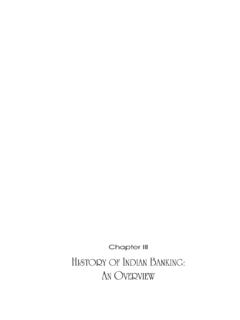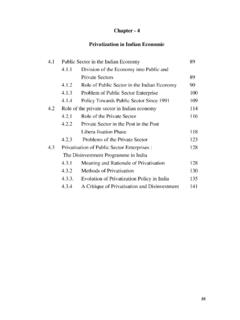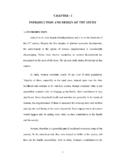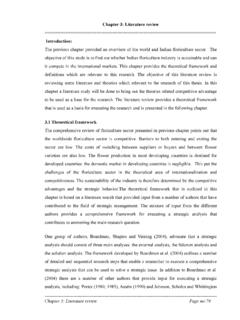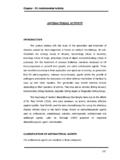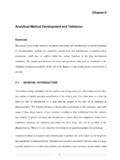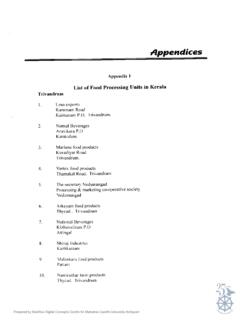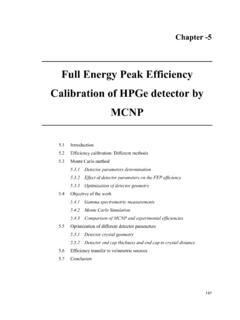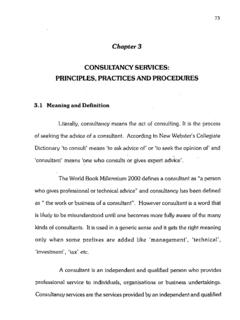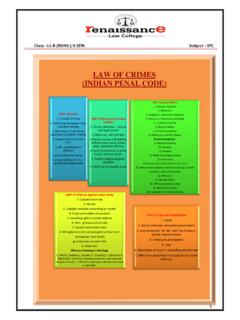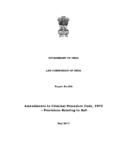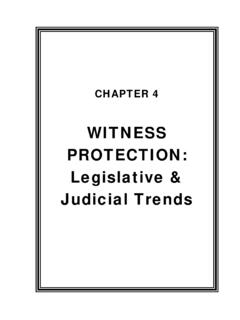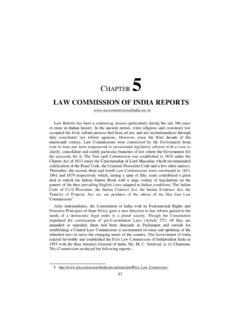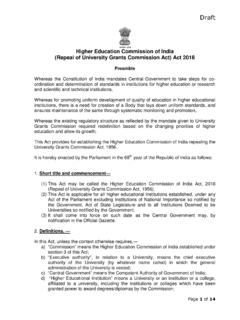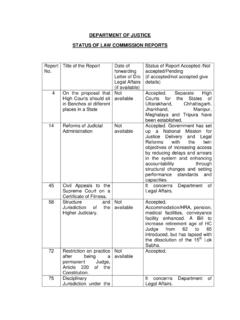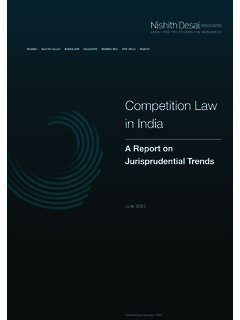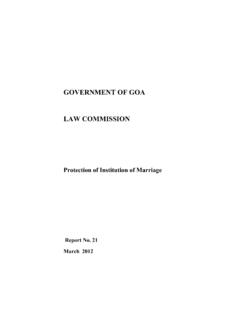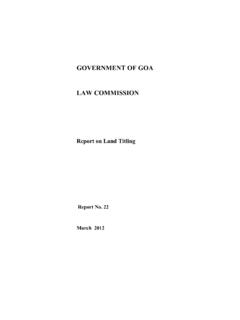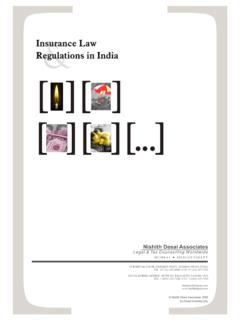Transcription of CHAPTER IV RECOMMENDATIONS OF THE LAW …
1 Ii^ m CHAPTER IV RECOMMENDATIONS OF THE LAW commission OF india ^ ^ 267 CHAPTER - IV RECOMMENDATIONS OF THE LAW commission OF india RECOMMENDATIONS of the Law commission of india : The Law commission of india prepared and submitted lOS"^*^ Report to the Government of india on Unfair Terms in Contract in 1984. The Report of the commission which was concerned with standard form contracts imposing unfair and unreasonable terms upon unwilHng consumers or persons who had no bargaining power was forwarded to the then Minister of Law, Justice and Company Affairs, Government of india on 28"" July 1984.
2 In 2006 the commission forwarded 199'*' Report which was, on unfair (Procedural and Substantive) Terms in Contract, to the Government of india . This 199"^ Report was forwarded to the Minister of Law and Justice on 3 T' August 2006. A. One Hundred and Third Report: The One Hundred and Third Repot of the commission focused on Unfair Terms in Contract. Although the RECOMMENDATIONS made by the commission in lOS"^ Report was concerned with standard form contracts imposing unfair and unreasonable terms on the individuals who are in a weaker bargaining position or have no bargaining power at all, the RECOMMENDATIONS was wide, and did not restrict itself to any particular type of contract. The commission in CHAPTER 1 of the Report noted that in an industrial society, the individual craftsman slowly fades out, giving place to mass production of standardized products.
3 Such standardization 268 ultimately leads to standardized contracts with customers, as in the case of large scale organization, which enter into innumerable contracts with individuals, it is very difficult to draw up a separate contract with each individual. The commission observed that there are advantages of such contracts as economy and certainty. However, these standardized contracts are not real contracts as the characteristics, usually and traditionally associated with a contract, such as freedom to contract and consensus, are absent from these contracts. The standard terms and conditions prepared by one party are offered to the other on a "take it or leave it" basis. The main terms are put in large print, but the qualifications are buried in small print.
4 As a result, these contracts turn out to be a case of big business enterprises legislating in a substantially authoritarian manner as they contain many wide exclusions and exemption clauses favourable to themselves. The law commission discussed the true nature and the origin of standard form contracts and observed that these standardized contracts are really pretended contracts and have only name of contract. These contracts are produced by the printing press and the pen of the individual signing the dotted lines does not really represent his substantial agreement with the terms in it, but creates a fiction that he has agreed to such terms and the characteristics, usually and traditionally associated with a contract, such as freedom to contract and consensus, are absent from these so called contracts.
5 The Law commission in CHAPTER 2 of the Report observed that large business concerns get expert advice and introduce terms in the printed forms, which are most favourable to themselves. They contain many wide exclusion and exemption clauses favourable to the large enterprise. The commission discussed the problem arising from such 269 contracts in standard form and the possibility of its misuse, and said the clauses are introduced, not always with the idea of imposing harsh terms as a result of superior bargaining power. The Law commission further tried to explain the problem by way of citing some decided cases of different High Courts relating to carriers. The commission cited the case oiIndian Airlines Corporation V. Jothaji Maniram^ in which the Madras High Court observed that a common carrier is a person who professes himself ready to carry goods for everybody.
6 He is considered to be in position of an insurer with regard to the goods entrusted to him and so his liability his higher but when it is expressly stipulated between the parties that a carrier is not a common carrier that conclusively shows that the carrier is not liable as a common carrier and even assuming that the carrier would be deemed to be a common carrier or held liable as such, it was open to such a carrier to contract himself out of the liability as common carrier or fix the limit of liability. The law commission also cited the case of Rukmanand V. Airway ( india ) Ltd. in which the Assam High Court held that the liability of the internal carrier by air, which is not governed by the Indian Carriage by Air Act, 1934, or by the Carriers Act, 1865, is governed by the English Common Law and not by the Indian Contract Act, 1872.
7 Under the English Common Law, the carrier's liability is not that of a bailee only but that of an insurer of goods, so that the carrier is bound to account for loss or damage caused to the goods delivered to it for carriage, provided the loss or damage was not due to an act of God or King's enemies or to some inherent vice in the thing itself The Common Law, however, allows the carrier almost an equal freedciTi to limit its liability by any contract or the conditions under which the carrier accepted delivery of the 270 gods for carriage. The terms could be far reaching and indeed the party could claim exemption even if the loss was caused on account of negligence or misconduct of its servants or even if the loss or damage was caused by any other circumstances whatsoever, in consideration of a higher or lower amount of freight charged.
8 The Law commission observed that, howsoever amazing a contract of this kind may appear to be yet that seems to be the state of law as recognized by the Common Law of England and adopted by Courts in india . The clause in a contract of carriage by air giving complete immunity to the carrier from liability could not be impugned on the ground that it was hit by section 23 of the Indian Contract Act, 1872 because according to the High Court the Indian Contract Act had no application to the case nor could it be said to be opposed to public policy. The Law commission also cited the case of Indian Airlines Corporation V. Madhuri Chaudhury' in which the Calcutta High Court dealt a case of a passenger travelling by air inside india . The plane crashed causing death of the passenger and his widow sued for damages.
9 The air ticket exempted the carrier from liability on account negligence of the carrier or of the pilot or of other staff There was evidence that the conditions exempting the carrier were duly brought to the notice of the passenger and that he had every opportunity to know them. It was held by the Calcutta High Court that the obligation imposed by law on common carriers in india is not founded upon contract, but on the exercise of public employment for reward. The liability of common carriers in india is not affected by the Contract Act, 1872. Therefore, no question of testing the validity of this exemption clause with reference to section 23 of the Contract Act would at all arise. The Contract Act does not profess to be a complete code dealing with the law relating to contracts.
10 An 271 exemption clause of this kind was not hit by any section of the Contract Act, be it section 23 or any other section, because the Contract Act itself had no application. No Act applies to internal carriage by air. The Warsaw Convention did not apply, nor was there any Statute which prevented or limited the scope or content of such an exemption clause. Both in respect of Contract Act and tort the present exemption clause set out was good and valid and it legally excluded all liability for negligence. It could not be held bad under Section 23 of the Contract Act, 1872. The commission again cited a case of Singhal Transport V. Jasaram in which the Rajasthan High Court held that whenever on the face of the goods, ticket, words to the effect "For conditions see back" are printed, the person concerned as a matter of law, held to be bound buy the conditions subject to which the ticket is issued, whether he takes care to read the conditions if printed on the back or to ascertain them if it is stated on the back of the ticket where they are to be found.
